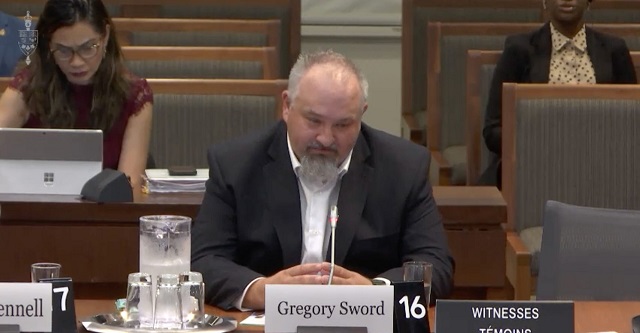Addictions
‘We just hand out pills’, father of overdose victim tells MPs about safer supply programs

Gregory Sword fights back tears during his testimony at the House of Commons Standing Committee on Health meeting ‘Opioid Epidemic and Toxic Drug Crisis in Canada’ on Sept. 24. (Screenshot/House of Commons)
In a House committee meeting Tuesday, grieving father Gregory Sword provided a poignant account of the problems with safer supply
In a poignant testimony that laid bare the devastating toll of Canada’s opioid crisis, Gregory Sword, father of a 14-year-old overdose victim, urged the House of Commons Standing Committee on Health to confront the failures of safer supply programs.
Despite the emotional weight of his story, neither Liberal nor NDP committee members asked Sword any questions during the 2.5-hour session, choosing instead to engage with the expert witnesses.
“I had to sit there and watch my daughter commit suicide for a year without being able to help her,” Sword said during the committee’s Sept. 24 meeting.
His daughter, Kamilah, died from an overdose in August 2022. Sword is pursuing a class-action lawsuit against the B.C. and federal governments for alleged negligence related to safer supply programs.
Since November, the House of Commons committee has been studying Canada’s opioid epidemic. The committee has been focused on the effectiveness of current harm reduction strategies, including controversial safer supply programs.
Proponents argue safer supply offers a regulated, pharmaceutical-grade alternative to toxic street drugs, which can prevent overdoses and connect individuals with addiction to treatment. Critics say such programs fail to address the root causes of addiction and potentially increase drug use and diversion.
The meeting underscored the ongoing tension between supporters and critics of these programs.
Subscribe for free to get BTN’s latest news and analysis, or donate to our journalism fund.
‘One click’
In his testimony, Sword discussed how easy access to safe supply drugs — such as Dilaudid, or “dillies” — contributed to his daughter’s addiction and eventual death.
“The ease that she was able to get safe supply was just one click on Snapchat, and she would be able to get any drugs she wanted within five minutes,” he said.
Sword, who travelled from his home in Port Coquitlam, B.C., at his own expense to attend the meeting, shared the challenges he faced watching his daughter cycle between overdoses and hospitalizations for two years.
He expressed frustration with mental health professionals who quickly discharged Kamilah, and with drug counselors who insisted it was not possible to intervene because Kamilah was not explicitly asking for help.
He explained that the lack of action following his daughter’s death put her friends at risk. Several have overdosed multiple times since Kamilah’s death. He is also frustrated by the lack of funding for treatment, pointing out that one friend had to wait more than a month to secure a rehab bed after seeking help.
“Even after [Kamilah] died, [drug dealers] were still messaging her cellphone,” said Sword, in response to a question from Laila Goodridge, the Conservative MP who invited Sword to attend the meeting. “My friend had access to her Snapchat account, and they were still asking if she’d need any dillies.”
Other witnesses also emphasized the negative impact recent drug policies have had on youth.
Dr. Patricia Conrod, a clinical psychologist from Université de Montréal, highlighted the need for evidence-based prevention programs. She noted that safer supply initiatives have increased youth access to potent opioids, and stressed the importance of providing services such as therapy and counselling alongside harm reduction.
Conrod also pointed to social media as a youth drug-use enabler.
“Using social media impacts your cognitive development and makes a young person more disinhibited and impulsive, and it contributes to ADHD symptoms,” she said. “We know that all three of those behavioural profiles and symptoms place a person at much higher risk for early onset substance misuse.”
 |
Dr. Patricia Conrod fields questions virtually during the House of Commons Standing Committee on Health meeting ‘Opioid Epidemic and Toxic Drug Crisis in Canada’ on Sept. 24. (Screenshot/House of Commons)
Dr. Martyn Judson, an addiction specialist from London, Ont., criticized safe supply clinics for inadequate oversight, leading to opioid diversion. “The perpetuation of a supply of opioids is … perpetuating the addiction. It’s not doing anything to change the lifestyle of the individual.”
He condemned excessive doses and lack of witnessed dosing as “unconscionable” and “tantamount to negligence.”
After the session, Sword expressed his frustration about the lack of questions from Liberal and NDP committee members.
“I have no problems with the experts talking, but ask me some questions, and I probably could give you a better answer than the experts on how that really affects parents and their kids,” he said.
“I hope this opens up their eyes to realize that there needs to be accountability for their decisions,” said Sword.
“They can’t just be like, ‘Oh, we’re going to do this and it doesn’t affect us’ because there’s no face. Now they can put my daughter’s face to their decisions.”
This article was produced through the Breaking Needles Fellowship Program, which provided a grant to Canadian Affairs, a digital media outlet, to fund journalism exploring addiction and crime in Canada. Articles produced through the Fellowship are co-published by Break The Needle and Canadian Affairs.
Subscribe to Break The Needle. Our content is always free – but if you want to help us commission more high-quality journalism, consider getting a voluntary paid subscription.
Addictions
The War on Commonsense Nicotine Regulation

From the Brownstone Institute
Cigarettes kill nearly half a million Americans each year. Everyone knows it, including the Food and Drug Administration. Yet while the most lethal nicotine product remains on sale in every gas station, the FDA continues to block or delay far safer alternatives.
Nicotine pouches—small, smokeless packets tucked under the lip—deliver nicotine without burning tobacco. They eliminate the tar, carbon monoxide, and carcinogens that make cigarettes so deadly. The logic of harm reduction couldn’t be clearer: if smokers can get nicotine without smoke, millions of lives could be saved.
Sweden has already proven the point. Through widespread use of snus and nicotine pouches, the country has cut daily smoking to about 5 percent, the lowest rate in Europe. Lung-cancer deaths are less than half the continental average. This “Swedish Experience” shows that when adults are given safer options, they switch voluntarily—no prohibition required.
In the United States, however, the FDA’s tobacco division has turned this logic on its head. Since Congress gave it sweeping authority in 2009, the agency has demanded that every new product undergo a Premarket Tobacco Product Application, or PMTA, proving it is “appropriate for the protection of public health.” That sounds reasonable until you see how the process works.
Manufacturers must spend millions on speculative modeling about how their products might affect every segment of society—smokers, nonsmokers, youth, and future generations—before they can even reach the market. Unsurprisingly, almost all PMTAs have been denied or shelved. Reduced-risk products sit in limbo while Marlboros and Newports remain untouched.
Only this January did the agency relent slightly, authorizing 20 ZYN nicotine-pouch products made by Swedish Match, now owned by Philip Morris. The FDA admitted the obvious: “The data show that these specific products are appropriate for the protection of public health.” The toxic-chemical levels were far lower than in cigarettes, and adult smokers were more likely to switch than teens were to start.
The decision should have been a turning point. Instead, it exposed the double standard. Other pouch makers—especially smaller firms from Sweden and the US, such as NOAT—remain locked out of the legal market even when their products meet the same technical standards.
The FDA’s inaction has created a black market dominated by unregulated imports, many from China. According to my own research, roughly 85 percent of pouches now sold in convenience stores are technically illegal.
The agency claims that this heavy-handed approach protects kids. But youth pouch use in the US remains very low—about 1.5 percent of high-school students according to the latest National Youth Tobacco Survey—while nearly 30 million American adults still smoke. Denying safer products to millions of addicted adults because a tiny fraction of teens might experiment is the opposite of public-health logic.
There’s a better path. The FDA should base its decisions on science, not fear. If a product dramatically reduces exposure to harmful chemicals, meets strict packaging and marketing standards, and enforces Tobacco 21 age verification, it should be allowed on the market. Population-level effects can be monitored afterward through real-world data on switching and youth use. That’s how drug and vaccine regulation already works.
Sweden’s evidence shows the results of a pragmatic approach: a near-smoke-free society achieved through consumer choice, not coercion. The FDA’s own approval of ZYN proves that such products can meet its legal standard for protecting public health. The next step is consistency—apply the same rules to everyone.
Combustion, not nicotine, is the killer. Until the FDA acts on that simple truth, it will keep protecting the cigarette industry it was supposed to regulate.
Addictions
The Shaky Science Behind Harm Reduction and Pediatric Gender Medicine


By Adam Zivo
Both are shaped by radical LGBTQ activism and questionable evidence.
Over the past decade, North America embraced two disastrous public health movements: pediatric gender medicine and “harm reduction” for drug use. Though seemingly unrelated, these movements are actually ideological siblings. Both were profoundly shaped by extremist LGBTQ activism, and both have produced grievous harms by prioritizing ideology over high-quality scientific evidence.
While harm reductionists are known today for championing interventions that supposedly minimize the negative effects of drug consumption, their movement has always been connected to radical “queer” activism. This alliance began during the 1980s AIDS crisis, when some LGBTQ activists, hoping to reduce HIV infections, partnered with addicts and drug-reform advocates to run underground needle exchanges.
The Bureau is a reader-supported publication.
To receive new posts and support my work, consider becoming a free or paid subscriber.
In the early 2000s, after the North American AIDS epidemic was brought under control, many HIV organizations maintained their relevance (and funding) by pivoting to addiction issues. Despite having no background in addiction medicine, their experience with drug users in the context of infectious diseases helped them position themselves as domain experts.
These organizations tended to conceptualize addiction as an incurable infection—akin to AIDS or Hepatitis C—and as a permanent disability. They were heavily staffed by progressives who, influenced by radical theory, saw addicts as a persecuted minority group. According to them, drug use itself was not the real problem—only society’s “moralizing” norms.
These factors drove many HIV organizations to lobby aggressively for harm reduction at the expense of recovery-oriented care. Their efforts proved highly successful in Canada, where I am based, as HIV researchers were a driving force behind the implementation of supervised consumption sites and “safer supply” (free, government-supplied recreational drugs for addicts).
From the 2010s onward, the association between harm reductionism and queer radicalism only strengthened, thanks to the popularization of “intersectional” social justice activism that emphasized overlapping forms of societal oppression. Progressive advocates demanded that “marginalized” groups, including drug addicts and the LGBTQ community, show enthusiastic solidarity with one another.
These two activist camps sometimes worked on the same issues. For example, the gay community is struggling with a silent epidemic of “chemsex” (a dangerous combination of drugs and anonymous sex), which harm reductionists and queer theorists collaboratively whitewash as a “life-affirming cultural practice” that fosters “belonging.”
For the most part, though, the alliance has been characterized by shared tones and tactics—and bad epistemology. Both groups deploy politicized, low-quality research produced by ideologically driven activist-researchers. The “evidence-base” for pediatric gender medicine, for example, consists of a large number of methodologically weak studies. These often use small, non-representative samples to justify specious claims about positive outcomes. Similarly, harm reduction researchers regularly conduct semi-structured interviews with small groups of drug users. Ignoring obvious limitations, they treat this testimony as objective evidence that pro-drug policies work or are desirable.
Gender clinicians and harm reductionists are also averse to politically inconvenient data. Gender clinicians have failed to track long-term patient outcomes for medically transitioned children. In some cases, they have shunned detransitioners and excluded them from their research. Harm reductionists have conspicuously ignored the input of former addicts, who generally oppose laissez-faire drug policies, and of non-addict community members who live near harm-reduction sites.
Both fields have inflated the benefits of their interventions while concealing grievous harms. Many vulnerable children, whose gender dysphoria otherwise might have resolved naturally, were chemically castrated and given unnecessary surgeries. In parallel, supervised consumption sites and “safer supply” entrenched addiction, normalized public drug use, flooded communities with opioids, and worsened public disorder—all without saving lives.
In both domains, some experts warned about poor research practices and unmeasured harms but were silenced by activists and ideologically captured institutions. In 2015, one of Canada’s leading sexologists, Kenneth Zucker, was fired from the gender clinic he had led for decades because he opposed automatically affirming young trans-identifying patients. Analogously, dozens of Canadian health-care professionals have told me that they feared publicly criticizing aspects of the harm-reduction movement. They thought doing so could invite activist harassment while jeopardizing their jobs and grants.
By bullying critics into silence, radical activists manufactured false consensus around their projects. The harm reductionists insist, against the evidence, that safer supply saves lives. Their idea of “evidence-based policymaking” amounts to giving addicts whatever they ask for. “The science is settled!” shout the supporters of pediatric gender medicine, though several systematic reviews proved it was not.
Both movements have faced a backlash in recent years. Jurisdictions throughout the world are, thankfully, curtailing irreversible medical procedures for gender-confused youth and shifting toward a psychotherapy-based “wait and see” approach. Drug decriminalization and safer supply are mostly dead in North America and have been increasingly disavowed by once-supportive political leaders.
Harm reductionists and queer activists are trying to salvage their broken experiments, occasionally by drawing explicit parallels between their twin movements. A 2025 paper published in the International Journal of Drug Policy, for example, asserts that “efforts to control, repress, and punish drug use and queer and trans existence are rising as right-wing extremism becomes increasingly mainstream.” As such, there is an urgent need to “cultivate shared solidarity and action . . . whether by attending protests, contacting elected officials, or vocally defending these groups in hostile spaces.”
How should critics respond? They should agree with their opponents that these two radical movements are linked—and emphasize that this is, in fact, a bad thing. Large swathes of the public understand that chemically and surgically altering vulnerable children is harmful, and that addicts shouldn’t be allowed to commandeer public spaces. Helping more people grasp why these phenomena arose concurrently could help consolidate public support for reform and facilitate a return to more restrained policies.
Adam Zivo is director of the Canadian Centre for Responsible Drug Policy.
For the full experience, please upgrade your subscription and support a public interest startup.
We break international stories and this requires elite expertise, time and legal costs.
-

 Business2 days ago
Business2 days agoCarney budget doubles down on Trudeau-era policies
-

 COVID-192 days ago
COVID-192 days agoCrown still working to put Lich and Barber in jail
-

 Business2 days ago
Business2 days agoCarney budget continues misguided ‘Build Canada Homes’ approach
-

 Business2 days ago
Business2 days agoCarney’s Deficit Numbers Deserve Scrutiny After Trudeau’s Forecasting Failures
-

 armed forces1 day ago
armed forces1 day agoIt’s time for Canada to remember, the heroes of Kapyong
-

 International2 days ago
International2 days agoKazakhstan joins Abraham Accords, Trump says more nations lining up for peace
-

 Alberta1 day ago
Alberta1 day agoAlberta’s number of inactive wells trending downward
-

 Censorship Industrial Complex1 day ago
Censorship Industrial Complex1 day agoSchool Cannot Force Students To Use Preferred Pronouns, US Federal Court Rules










